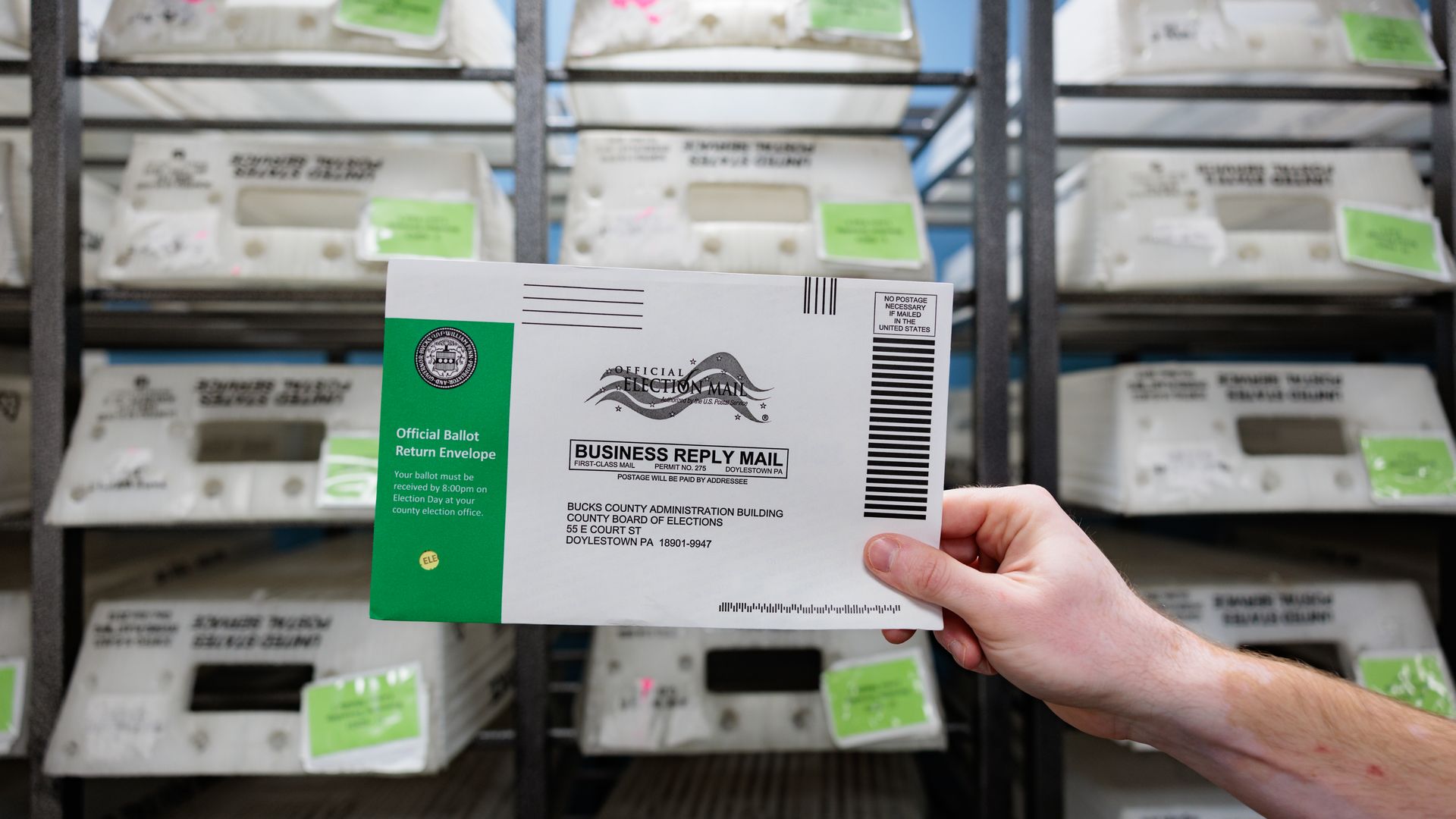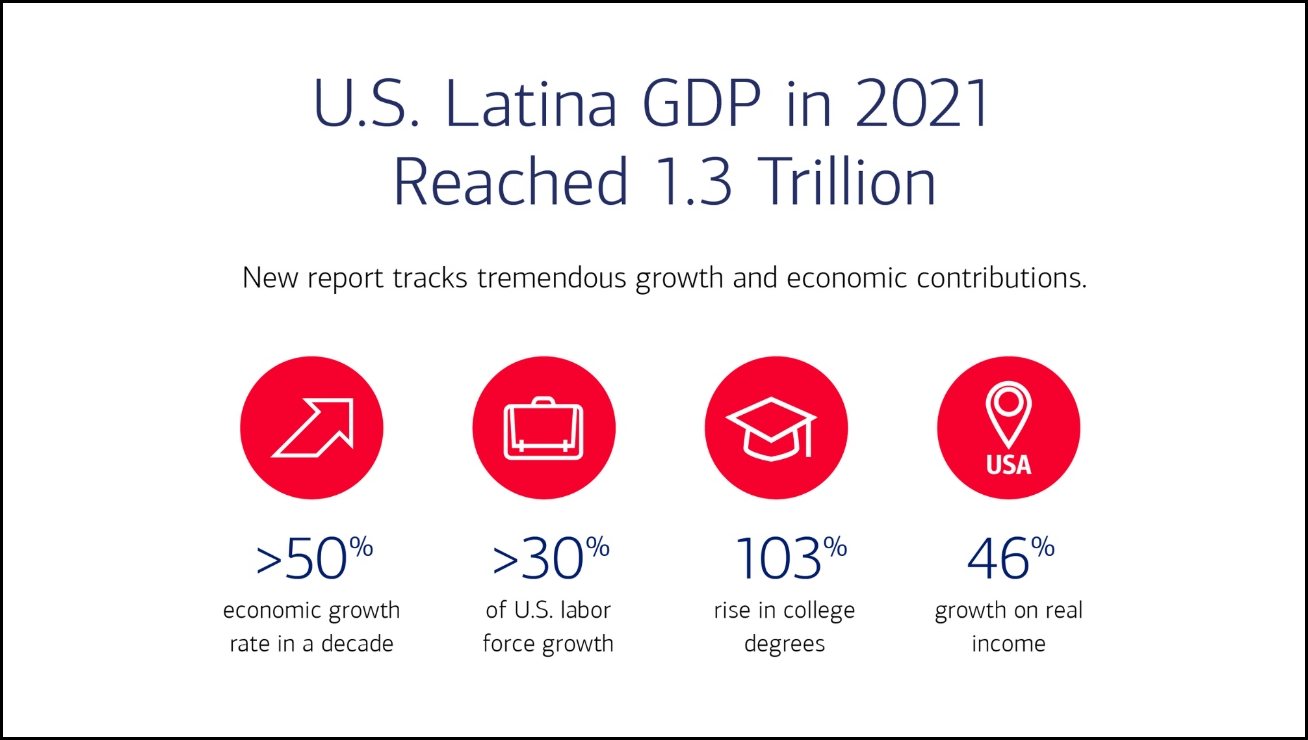| | | | | | | Presented By Bank of America | | | | Axios Latino | | By Marina E. Franco (Noticias Telemundo) and Russell Contreras (Axios) · Oct 03, 2024 | | 🎃 Just 28 days until Halloween! (Which has nothing to do with this newsletter, we just really love Halloween) 👀 En español 👀 This newsletter, edited by Alison Snyder, is 1,104 words, a 4-minute read. | | | | | | 1 big thing: Latina GDP is skyrocketing | | By Russell Contreras | | |  | | | Latinas celebrates Mexico Independence Day with a parade down Fifth Avenue, in the Sunset Park neighborhood of the Brooklyn borough of New York City. Photo: Andrew Lichtenstein/Corbis via Getty Images | | | | The total economic output of U.S. Latinas has grown by more than 51% since 2010 and is now larger than all but three states, a new report finds. Why it matters: Latinas are a driving force in the U.S. economy despite facing significant economic disparities. By the numbers: The 2021 U.S. Latina GDP was $1.3 trillion, up from $661 billion in 2010, and about 5.6% of the overall U.S. GDP, the analysis of the latest available data found. - The total economic output of Hispanic women in 2021 was larger than the entire economy of the state of Florida. Only the GDPs of California, Texas and New York are larger than the U.S. Latina GDP, the report found.
- From 2010 to 2021, the real GDP of Latinas grew at 1.2 times the rate of Hispanic men's GDP and at 2.7 times the rate of the non-Hispanic GDP.
Yes, but: Latinas stand to lose $2,672 every month or $32,070 every year because of wage disparity, according to the National Women's Law Center. - These lost wages could have paid for a full year of rent and rob Latinas of the opportunity to invest in their education, homeownership and retirement, the center says.
Zoom out: All U.S. Latinos saw their GDP reach $3.6 trillion in 2022, growing faster than most wealthy global economies. - If U.S. Hispanics were an independent country, they'd have the fifth largest economy in the world for the second consecutive year.
- A new report from Bank of America, in partnership with UCLA and California Lutheran University, attributes the rise in Latino GDP mainly to the economic output of Latinas.
What they're saying: "Latinas are just a force to reckon with," Raquel González, president of Bank of America Silicon Valley, tells Axios. - González says the Latina GDP is primarily driven by consumption, reflecting strong spending power despite not earning as much as their male counterparts.
Keep reading. |     | | | | | | 2. Latino rivals in Colorado's most competitive race | | By Esteban L. Hernandez | | |  | | | U.S. Rep. Yadira Caraveo (D-Thornton) and Republican state Rep. Gabe Evans. Photos: Esteban L. Hernandez/Axios | | | | Politics separate U.S. Rep. Yadira Caraveo, a Democrat, from her Republican challenger state Rep. Gabe Evans, but the two are linked by a common Mexican heritage. The big picture: It's the first time in Colorado history two competing major-party candidates running for a Congressional seat are Latino, highlighting the changing demographics of the state. - It's something experts tell Axios could play a role in a district with the state's largest share of Hispanic voters.
Context: Caraveo's family immigrated from Chihuahua, and Evans has publicly spoken about his Mexican grandfather, who earned U.S. citizenship after serving in the military during World War II. - Their backgrounds are likely to draw more voters who are "excited" about an already competitive race, Robert Preuhs, a political science professor at Metro State University, tells Axios.
State of play: Latinos were instrumental in Caraveo's narrow 2022 win to represent the suburban Denver seat and will again play a major role as advocacy groups intend to lure voters to the polls over issues like abortion. What we're watching: Danny Friedman, a national director for campaigns and programs at Mi Familia Vota, a nonprofit civic advocacy organization, says Latinos in the district are likely to see increased voter outreach, which could translate to higher engagement. Keep reading. |     | | | | | | 3. Podcast surveys Latino voters in swing states | | By Marina E. Franco (Noticias Telemundo for Axios) | | |  | | | A test ballot during a demonstration of how absentee and mail-in votes will be counted in Pennsylvania, Sep. 30. Photo: Hannah Beier/Getty Images | | | | A new podcast series features interviews with Latino voters in key swing states about the issues and concerns that are shaping their vote in next month's presidential election. Why it matters: A record number of Hispanics are eligible to vote this year, many living in Arizona, Colorado, Florida, Nevada and other states that could end up deciding the winner of a tight presidential race. Zoom in: The Spanish-language podcast "El Péndulo" — swing states are sometimes referred to in Spanish as péndulos (pendulums)— is produced by Noticias Telemundo and Radio Ambulante Studios, an offshoot of the award-winning Spanish-language NPR podcast series. The first episode out today focuses on Hispanics in Pennsylvania's newly-dubbed Latino belt region, which includes the cities of Hazleton and Reading. - Interviewees talk about previous anti-immigrant local ordinances, changing partisan preferences and other issues, including crime.
- Radio Ambulante Studios will also be hosting listening clubs in cities like Philadelphia, Las Vegas and Phoenix to foster additional discussions with local Latinos.
What they're saying: "This election the Latino vote will again be decisive, but from talking with people it feels like how it'll lean could be a crapshoot," Amilcar Arroyo, editor of a local Spanish-language newspaper and one of those interviewed, says in the first episode. |     | | | | | | A message from Bank of America | | Latinas are a driving force for U.S. economy | | |  | | | | The U.S. Latina GDP Report, funded by Bank of America, is the first study of its kind to capture the expanding economic contributions of Latinas in America. A takeaway: Latinas contributed $1.3 trillion to the U.S. GDP in 2021. Read the report. | | | | | | 4. Stories we're watching | | |  | | | Illustration: Natalie Peeples/Axios | | | | 1. Argentines held large marches yesterday to protest planned cuts to public universities. - The cuts are part of President Javier Milei's anti-inflation measures that have already included closing government ministries, strikingdown pensions spending and freezing funds for public health.
- Data released last week shows the poverty rate in the South American nation rose to more than 50% in the last six months.
2. More than 150 members of Venezuelan opposition parties are currently detained, according to a tally from Vente Venezuela, a group that is part of the opposition coalition. - They join about 2,000 people who've been arrested on unclear charges in the past two months during the protests that followedthe July 28 presidential election.
- President Nicolás Maduro claims he won a third term, but has refused to publish vote tally sheets, while the opposition says it gathered ballot tallies from about 80% of poll sites that show their candidate, Edmundo González Urrutia (now in exile), handily won instead.
|     | | | | | | 5. Pachanga: Cassi Williams | | |  | | | Photo illustration: Axios Visuals. Photo: Kim Williams | | | | We are so impressed by today's pachanga recipient, 16-year-old Cassi Williams! - At 15, she testified before the Rhode Island Senate Labor Committee in support of the Workplace Psychological Safety Act, which would protect workers from psychological abuse at work.
- Now she's working on introducing a similar bill in Washington, D.C.
Keep up your great work, Cassi! 🎤 Please send us your pachanga nominations by filling out this form or replying to this email! |     | | | | | | A message from Bank of America | | U.S. Latina GDP surges ahead | | |  | | | | U.S. Latina GDP is growing 2.7 times faster than other groups. Get up to date: From 2010 to 2021, GDP for U.S. Latinas increased by 51.1% compared to 18.8% for non-Hispanic GDP. Explore this first-of-its-kind data, supported by Bank of America. | | | | 🇵🇱 Russell is headed to Poland. 💻 Marina is struggling with her computer making sputtering noises. 🗺️ Astrid is off. Our gratitude goes out to Carlos Cunha and Axios Visuals for their many contributions! |  | Your essential communications — to staff, clients and other stakeholders — can have the same style. Axios HQ, a powerful platform, will help you do it. | | | |

0 comentários:
Postar um comentário